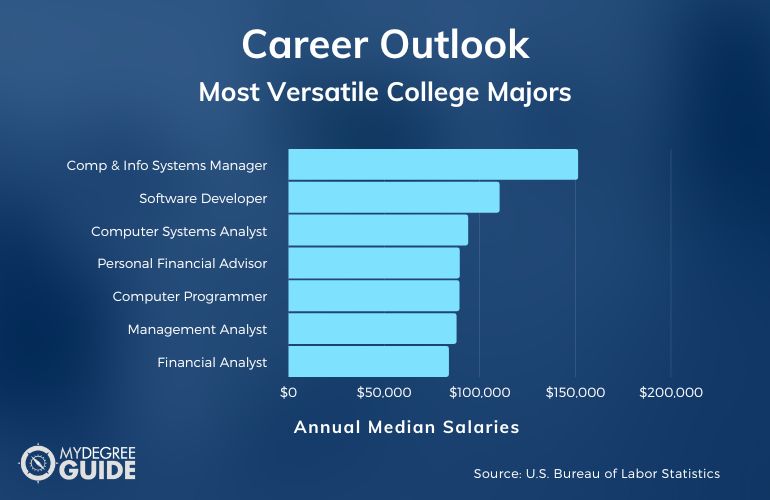If you are planning to obtain a college degree but have not yet chosen a major, you may be wondering about the most versatile college majors.

You may be concerned that a highly specialized degree may be limiting when trying to find a job. A versatile major may provide you with a well-rounded education and may be useful for pursuing multiple career paths.
Editorial Listing ShortCode:
This article aims to help you identify the most versatile majors available.
Most Versatile College Majors Online
Here are some of the most versatile online bachelor’s degree programs. All of these practical majors can be commonly found at accredited online colleges.
Regardless of the specialty you select, you will still receive a strong foundation in any related courses.
Business Administration

Business administration is one of the most versatile majors because businesses in all industries need people to do administrative work.
A degree in business administration can help you get a job in international business, finance, corporate sales, human resources, or marketing. Business administration degrees typically lead to corporate office jobs, but there are a variety of different types of jobs within that context.
A business administration program teaches different aspects of managing a business. Subjects studied as part of a business administration degree include finance, accounting, management, marketing, human resources management, economics, and international business.
Editorial Listing ShortCode:
People who get business administration degrees at the undergraduate level may also choose to continue their studies by pursuing MBAs or other graduate degrees related to business.
A business administration major is one of the most versatile degrees you can get because it involves studying many different topics that are helpful in the business world.
Communications

A communications major is all about how to effectively convey information within businesses, organizations, and other large groups of people.
Communications is regarded by some as an overly vague degree, but a degree in communications or a related field is often a basic requirement to apply for jobs in journalism or media.
Many reporters and television news producers and editors have communications degrees. Communications knowledge may also be applied in the advertising industry and in some sales and business jobs.
Editorial Listing ShortCode:
Communications is a broad degree that often includes courses on corporate communication, current issues in journalism, communication theory, media ethics, public relations, media technology, research methods, and news writing and reporting.
Obtaining a communications degree does not usually require completing any advanced math or science coursework. Of course, requirements may vary across different colleges and universities.
Computer Science

Because of the widespread use of technology in the modern world, computer science is one of the most useful undergraduate degrees available. Nearly all businesses today use computing technology in some capacity and need employees with computer science knowledge.
Computer science is the study of various types of computing technology. Computer science involves both theoretical knowledge and practical applications of that knowledge.
Unlike computer engineering, the focus of a computer science major is typically more on software than on hardware. Common career paths for computer science graduates include computer network architect, computer programmer, and computer systems analyst.
Editorial Listing ShortCode:
There are also coding boot camps that can help prepare you to work in these same types of occupations. A college degree in computer science, though, provides a more in-depth curriculum and theoretical background knowledge.
Common required courses to earn a computer science degree include calculus, computer theory, computer architecture, algorithms, artificial intelligence, and data management.
Finance

Finance is another practical degree you can get. A finance degree covers the financial aspects of running a business.
A finance degree is somewhat different from a business administration degree in that it tends to focus more on mathematics and economics. A business administration degree, on the other hand, focuses a little bit more on interpersonal aspects of running a business, including human resources management and customer service skills.
Finance is still a very versatile major because businesses in nearly every industry need people to aid in financial planning. Finance degrees teach about budgeting, investing, and how to analyze and limit expenses for a business.
Editorial Listing ShortCode:
Common course requirements for finance degrees include management, accounting, business law, business ethics, economics for business, and strategic cost analysis. Finance degrees may require some higher level math, including calculus.
Finance majors can often get jobs as financial or budget analysts for businesses or even as financial managers. Some finance majors work as personal financial advisors and planners. Instead of helping businesses and corporations, they help private individuals manage their money and plan investments.
Information Technology

Information technology is the study of computer systems that organize and store data. This is another flexible degree that has practical applications in almost every industry.
Information technology overlaps somewhat with computer science. Computer science is primarily about programming and the theoretical knowledge behind it. Information technology is more about using technology to support the goals of a business.
Editorial Listing ShortCode:
In terms of careers, computer science professionals often spend a lot of time writing codes and working independently. Information technology professionals, on the other hand, often work collaboratively with other people in the business to solve problems involving technology. IT professionals may also work in customer support.
Common course requirements for an information technology degree include website design and development, cybersecurity fundamentals, programming languages, computer architecture, operating systems, and information retrieval and web search.
Careers & Salaries

According to the Bureau of Labor Statistics, the following careers are associated with degrees in business administration, communications, computer science, finance, and information technology.
| Careers | Annual Median Salaries |
| Computer and Information Systems Manager | $151,150 |
| Software Developer | $110,140 |
| Computer Systems Analyst | $93,730 |
| Personal Financial Advisor | $89,330 |
| Computer Programmer | $89,190 |
| Management Analyst | $87,660 |
| Financial Analyst | $83,660 |
| Technical Writer | $74,650 |
| Human Resources Specialist | $63,490 |
| Reporter, Correspondent, or Broadcast News Analyst | $49,300 |
Business administration, communications, computer science, finance, and information technology are all very broad occupation groups with a wide variety of possible careers.
Admissions Requirements

Here are some common admissions requirements to get into a bachelor’s degree program for business administration, communications, computer science, finance, or information technology.
- High school diploma
- Personal statement or essays
- References from teachers or other mentors
Some colleges may also require SAT or ACT scores, but a growing number of schools are no longer requiring this.
Accreditation

Regional accreditation is a process by which colleges and universities are periodically evaluated by an outside organization to ensure that they meet certain standards of quality.
Accreditation helps to ensure that you receive a good education and that your degree is considered legitimate by potential employers. Before enrolling at any college or university, you may want to make sure it is accredited.
Editorial Listing ShortCode:
For more information about accreditation, or to find a regionally accredited school, you can visit the website for the Council for Higher Education Accreditation (CHEA).
Financial Aid and Scholarships

There are many different types of financial assistance available to students who qualify. You may be eligible for federal aid, state aid, or employer programs. In some cases, grants or loans may also be available. Some colleges even offer their own scholarships based on need or merit.
To apply for federal financial aid, you can fill out the Free Application for Federal Student Aid (FAFSA).
What Can You Do with a Bachelor’s Degree?

A bachelor’s degree, sometimes called a bachelor of arts degree or a bachelor of science degree, may be the gateway to many different types of careers. Degrees in business administration, communications, computer science, finance, and information technology have applications in many different industries.
Common careers for business administration majors include management analysts and human resources specialists. A communications degree may lead to careers in media and journalism.
Computer science and information technology degrees can help you land a job in tech support or software development. With a finance degree, you may give budgeting and investing advice to companies or private individuals.
How Long Does It Take to Get a Bachelor’s Degree Online?

If your program follows a 16 week semester, you will typically need 4 years to complete a bachelor’s degree if you attend full-time.
If you follow an 8 week semester and stay continuously enrolled in courses year-round, you may finish in less time. You may also take courses during the summer or winter if you want to speed up your timeline and get a bachelor’s degree fast.
Online degree programs are often more flexible than traditional degree programs, so you may be able to arrange your schedule in whatever way works best for you.
What Is the Most Useful Major in College?

The major that can be most useful to you depends on where you want to go with your career.
Business administration, communications, computer science, finance, and information technology are some of the best majors in college for the future. Each has numerous possible career paths in many different industries.
These same majors may not be the most useful to you personally if you plan to pursue a more specific career path. For some people, a highly specialized major might be the right choice. You may want to consider the career path you want before choosing a major.
How Do I Decide What to Major In?

Choosing a major can be a difficult decision for many prospective college students. You may consider thinking of your education as an investment. It may cost time and money in the present, but it may pay off in the long-term with greater chances of employment or a higher-paying job.
Here are some things to consider when choosing the best degrees to get:
- How much demand there is on the job market for a specific degree
- What kind of salary you can expect within a specific field
- Your own passions and interests
There may be more employment opportunities in some fields than others. Some fields may have a high earning potential, but there may be a limited number of jobs available. Some degrees may be very useful on the job market once you have a graduate degree, but they may not reach their full potential if you only have an undergraduate degree.
Editorial Listing ShortCode:
The job market is always changing. You may want to consider which major will give you the best return on your investment while also taking your personal interests into account.
Is a Bachelor’s Degree Worth It?

Yes, a bachelor’s degree is worth it for many students. The Bureau of Labor Statistics reports that jobs requiring a bachelor’s degree for entry are set to grow at 6% over the next 10 years, faster than the average job growth for all occupations.
Common careers include computer and information systems manager, software developer, computer systems analyst, personal financial advisor, and computer programmer.
Bachelors degrees in business administration, communications, computer science, finance, and information technology may be applied in many different fields. Obtaining one of these most practical degrees could open the door to new career paths.
Getting Your Bachelor’s Degree Online

When considering pursuing a bachelors degree, there are many colleges and universities to choose from.
In this digital age, there are many online options available that offer flexible schedules, including everything from a traditional on-campus science degrees to programs offering theology degrees online, for example. Online programs may enable you to earn a degree in spite of transportation or scheduling limitations.
There are many popular majors that provide flexible career options. Degrees pertaining to business and technology tend to be the most flexible degrees, and communications also pertains to many different fields. You may take the first step of your educational journey today by exploring online bachelor programs from accredited universities.
